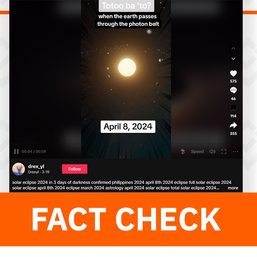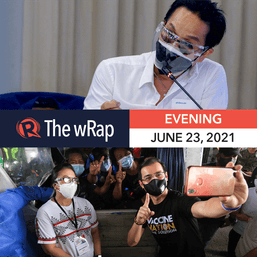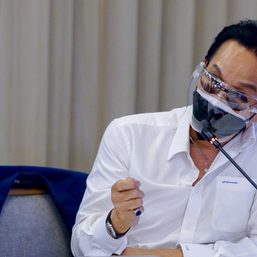SUMMARY
This is AI generated summarization, which may have errors. For context, always refer to the full article.
 I. The Feature Presentation
I. The Feature Presentation
Once again, Tito Sen’s got it all wrong.
In a privilege speech on Wednesday, August 29, Senate Majority Leader Vicente Sotto III refused to be held accountable for the many proven instances of copyright infringement and plagiarism committed in his turno en contra speeches (delivered on August 13 and August 15). He made no mention of the 4 blogs, one university website, and one research paper from which he stole. And without naming American blogger Sarah Pope (who has called him “a lying thief”), the comedian asked the Senate to expunge his reference to Natasha Campbell-McBride, the doctor Pope wrote about in her blog post, which Sotto plagiarized.
Sotto may have acted like he was addressing the plagiarism issue, but he was actually deftly evading it. Instead, he cast himself in the role we Filipinos love—that of the underdog.
“Maybe I’m the first senator in the Philippines to fall victim to cyber-bullying,” he said in Filipino. He surmised that accusations of plagiarism were the strategy of those who support the RH Bill, “with their millions of funds.” Sotto claimed to have been denigrated as uneducated. (Though if you step in shit, and you wade in further, can you fault people for calling you an idiot?) More importantly, he moaned that the plagiarism has distracted from proper discussion of the RH Bill.
But this distraction can only be blamed on Sotto and his team. His copy-and-paste jobs, his dismissive denials, and the obfuscations of chief of staff Hector Villacorta have been the script of this ongoing dramedy. It is an example of the tail trying to wag the dog. As Sotto said, in a line worthy of Chuck Norris: “If you can’t kill the message, kill the messenger.” Naks!
Studly he may be, but this is yet another example of the senator being obtuse, perhaps willfully. The shabbiness of his message, and its unethical method, is precisely what plopped him in the shark tank. To paraphrase that famous song: You’re so vain, to think this story’s about you.
In fact, Sotto’s message has been replied to, addressed, and debunked again and again, by so many articles, essays, and blog entries. Most recently, on this site alone, there was Sylvia Claudio, who proved the fallacies and inaccuracies in Sotto’s speeches. There was also Dr. Margarita Holmes, who proved the weakness behind the medical and scientific arguments Sotto and company have put forward against oral contraceptives. But how can the hard facts offered by these ladies compare to the grand, subjective abstractions of faith, family values, and a fight for “the sanctity of life”?
No, Sotto is certainly not as dumb as he claims we think he is. He’s certainly smarter than he looks. This is a man who got rich in showbiz, who got elected in politics, and who gets away with far more than he should. He’s a smart dude. But Mr Sotto, we see what you are doing.
On the grand stage of our country’s Senate, he yesterday played to a distinct crowd by underscoring his Everyman status, by invoking his work on Eat Bulaga, by reciting a poem by Joey de Leon, and by doing it decidedly (unlike his past speeches) in mostly straight Filipino.
There’s certainly nothing wrong with that. But it doesn’t exonerate him from the issues at hand. In fact, pushing the wedge deeper into existing class divisions betrays his lack of capacity, and imagination. Divide and conquer—the oldest trick in the book.
It is an act that is both condescending to those who lack money and education, and disdainful to those blessed with either or both. The latter may not have necessarily voted for Sotto, but he is still a senator to all Filipinos, regardless of language, class, and background. All Filipinos have the right to hold him to account and demand a proper response to concerns, queries, and allegations.
In the fierce partisanship surrounding the RH Bill, we mustn’t forget that politics, law, journalism, art, faith, and pop-culture are all part of an ongoing discussion about who we were, are, and want to be as a people. The Senate, ideally, is both the palengke and cathedral for that conversation.
And as senator, Sotto, of all people, should understand that “dissent is the highest form of patriotism,” as New York Mayor John Lindsay once said. And just as Sotto proudly dissents against the RH Bill, we unelected Filipinos should also be allowed to dissent against the leaders we elect.
Walang personalan, Tito Sen. It’s just how we all decide on our country’s future. We deserve more than this song that goes with your dance.
II. The Extended Cut
No zarzuela, however, would be complete without a love story. Enter stage right, Hector Villacorta, whose devotion to his boss is actually kinda romantic. Like a jealous lover, Villacorta spurned Sarah Pope, flicking her away with the kind of bitter apology we all know from half-resolved lover’s quarrels.
When asked about the 5 other instances of plagiarism, Villacorta said he’d only comment if the plagiarized parties complained. As the GMA Network quoted him as saying: “If they can show that it’s verbatim, and they’re the source [that’s when it might be plagiarism]. Pero hindi copyrighted, so there’s no infringement.”
On cue, enter two new characters. Janice Formichella is a women’s activist whose work on Feminists for Choice was plagiarized by Sotto. Peter Engelman is a writer and editor, whose work on NYU’s Margaret Sanger Papers Project was also similarly ripped off.
Janice Formichella told me on the phone: “I have learned a lot about the RH Bill in question and absolutely do not like knowing my work has been used in a context to argue against legislation that has obvious benefits to the people of the Philippines.”
I asked Formichella what she thinks of the RH Bill. “This type of bill is what I’d like to see happen in all countries,” she said.
Did she think Sotto plagiarized her work? Formichella said yes. “The suggestion that the work of bloggers can be used without citation is obviously not a factual statement,” she replied. “Our site clearly states that the work is copyrighted.”
Formichella also expressed her dismay at having her words twisted by Sotto. “My blog post made a specific, powerful statement. It’s not everyday that people criticize Ghandi. I thought it was important enough for people to realize that Ghandi missed out on a really big opportunity to advocate for something that would’ve changed, possibly, the landscape of India as a whole. So I don’t appreciate my work being used for the opposite reasons at all.”
“The point of my article is to highlight that refusing to support the accessibility of contraceptives is detrimental to societies,” Formichella said. “I’m angry that it was used out of context, as it was.”
“This is not the proper way to go about writing political speeches,” she said, of Sotto manipulating her work advocating women’s rights. “Why do they have to use pro-choice bloggers? It’s not like there is a lack of arguments from the other side.”
I asked Formichella what she’d like to see from Sotto and his staff. “They act as if they plagiarized, but they refuse to admit it at the same time,” she said. “I’d like them to recognize that this took place.”
Peter Engelman, whose work was copied-and-pasted by Sotto from the NYU website, wrote me in an email today: “It has come to my attention that Senator Vicente C Sotto III, the Majority Leader in the Philippine Senate, has lifted a passage from one of my articles without attribution. The Senator used my words in a speech he gave on August 15 regarding a bill before the Philippine Senate (SB2865). The passage, from my article ‘Gandhi and Sanger Debate Love, Lust and Birth Control,’ from the Winter 1999/2000 Margaret Sanger Papers Project Newsletter, issue 23, appears nearly verbatim and without quotation marks or citation information. Neither the Senator nor anyone associated with him asked my permission or contacted the Sanger Project. I find this misuse of my writing to be deceptive, unethical and unacceptable. The accessibility of published material on the Internet in no way lessens the basic protections all writers rely on under intellectual property rights.”
One wonders if this highlights the fact that the authors’ works were indeed copyrighted, and if their words now constitute a complaint. What say you now, Mr Villacorta?
III. The DVD Extras
In Sotto’s speech Thursday, he said that, according to Atty. Louie Calvario, from the Office of the Director General of the Intellectual Property Office: “The crime of plagiarism is not defined in our laws, particularly the Intellectual Property Code and the Revised Penal Code. Neither can it be characterized as copyright infringement since it did not economically injure the author.” In Calvario’s opinion, “the act was not copyright infringement since the defense of statutory fair use (Sec. 184.1 IP Code) and fair use (Sec. 185, IP Code) can be invoked.”
I don’t enjoy attorney status, but as a concerned citizen, is it wrong for me to ask: What about Sec. 172.1 of the Intellectual Property Code of the Philippines? That part says: “Literary and artistic works, hereinafter referred to as ‘works,’ are original intellectual creations in the literary and artistic domain protected from the moment of their creation and shall include in particular: (a) Books, pamphlets, articles and other writings; and (o) Other literary, scholarly, scientific and artistic works.”
And what about Sec. 172.2, which says: “Works are protected by the sole fact of their creation, irrespective of their mode or form of expression, as well as of their content, quality and purpose.”
This, I think, is a discussion worth having.
Though perhaps it’s moot, since Sotto, as senator, enjoys parliamentary immunity. Which so happens to be covered in the section “B. 2. Purpose of the Privilege” of the Senate’s Terms of Office and Privilege.
It says: “Members of Congress cannot be prosecuted for any words spoken in debate or in connection with voting or used in written reports or with things generally done in a session of either House in relation to the business before it … The purpose of this privilege of speech or debate is not to protect the members against prosecutions for their own benefit but to enable them as representatives of the people to execute the functions of their office without fear of prosecution, civil or criminal.”
It goes on: “As held in the case of Osmeña v. Pendatun, the Supreme Court took the occasion of defining the purpose of the privilege. It ruled: ‘[Parliamentary immunity] guarantees the legislator complete freedom of expression without fear of being made responsible in criminal or civil actions before the courts or any other forum outside of the Congressional hall. But it does not protect him from responsibility before the legislative body itself whenever his words and conduct are considered by the latter disorderly or unbecoming to a member thereof.'”
Am I the only one who thinks Sotto’s conduct is unbecoming of a member of the Senate? He may be exempt from criminal liability, but he should at least be held responsible before the legislative body itself. A Senate Ethics Committee investigation should not be too much to ask.
Senate President Enrile seems to unwittingly agree. He’s boldly called for legislation to explicitly cover plagiarism of blogs. (Though Mr. Enrile, sir, it’s best not to say you want to “regulate” them. It sounds like censorship.)
According to a Manila Bulletin article, he clarified his stance against plagiarism:
“I do not consider myself a writer,” he said, “but I know you have to make a proper attribution. But if your failure to attribute is done in good faith, you respect the opinion you borrow, you believe in the material that you borrowed, to support your position on a given issue I think should be in assumption of good faith.”
In this case, however, it seems safe to assume that Sotto’s failure to attribute was not done in good faith. He did not respect the opinions of those he borrowed, he did not apologize when they complained, and he has not taken steps to properly address the issues of plagiarism or copyright infringement.
Until that happens, we’ll keep on calling for this wrong to be made right. – Rappler.com
Add a comment
How does this make you feel?









There are no comments yet. Add your comment to start the conversation.